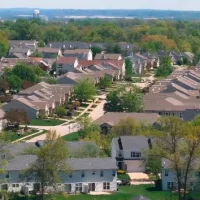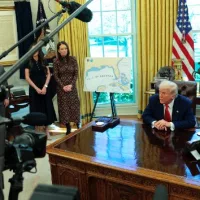
(RALEIGH, N.C.) — In the Research Triangle area in and around Raleigh, North Carolina, home sales and construction development are booming as thousands flock to the area in search of affordable homes close to work.
However, the severe tariffs President Donald Trump put on virtually all U.S. trading partners have created uncertainty within the U.S. housing market.
Leonard Windham, a Raleigh area realtor, gave ABC News a tour of a new housing development in Youngsville — an up-and-coming town just 20 miles north of Raleigh.
“In the real estate industry, we’re just not sure what’s going to happen,” Windam said. “If there’s a possibility, of course, as the price of construction material goes up, it could affect the home price.”
Realtors and homebuilders told ABC News they are moving forward with their spring housing market goals despite not knowing how the new tariffs could impact costs.
Tariffs may change home construction as we know it, as rising costs could potentially encourage construction companies and developers to invest in American manufacturing.
Alex Yost, vice president of the North Carolina Home Builders Association, told ABC News he is rethinking where to source materials when building new homes.
“We’re going to be looking at pricing. We’re going to be making sure that our clients get the value that they want and need,” he said. “And so, to the extent that Chinese light fixtures end up costing more, then that’s certainly going to factor into the decisions that we make, absolutely.”
Yost noted that his primary concern is if and how tariffs will affect their building material supply chain, but he’s also worried about consumer confidence.
“Last week’s news about the market is probably going to cause some buyer confidence gaps, and so we are concerned,” he said. “Mostly, what we’re concerned about is that buyers feel good about making the acquisition of a new home, and we build luxury homes, but the entire marketplace is built on people buying the most expensive thing they ever bought. They’ve got to feel good going into it.”
Homebuilders breathed a collective sigh of relief after Trump exempted major construction materials like Canadian lumber and Mexican gypsum from retaliatory tariffs. However, costs will rise for imported steel, aluminum, copper, home appliances and other building materials sourced abroad.
Builder confidence in newly built single-family homes is at the lowest level it’s been in seven months, according to the National Association of Home Builders (NAHB).
Home costs are expected to rise another $9,200, the group said. It estimated that about 7% of products used in new construction projects come from other countries — that amount can fluctuate depending on which products a home buyer wants and how much they are willing to spend.
Some prospective homebuyers told ABC News they are not worried about tariffs impacting their ability to buy a home, simply because they haven’t seen home prices shoot up as a result.
“Personally, no because I don’t have a whole lot of experience of what that is going to mean for me as a homeowner,” Deishali DeWitt, a 33-year-old first-time home buyer, said.
DeWitt, who has been looking for a year, told ABC News that prices were “ridiculous” before the tariffs.
“The past or two years ago, I remember looking…houses were about half the price that they are right now,” she said. “So that’s been part of why it’s taken me some time. Like, do I really want to pay for a house that’s $600k right now? That was worth $250k just two years ago?”
Windham — the Raleigh area realtor — said first-time home buyers care most about one thing: cost per month. That cost has been pushing homebuyers farther out from major cities, to more affordable areas with new development.
“They’re looking at monthly payment, and they have a set number in mind,” Windham said.
If buyers pull back amid economic uncertainty and there’s less demand for homes, residential construction could also slow down and potentially exacerbate the country’s housing shortage.
“When we start to see tariffs come into play, what then happens to an interrupted supply chain or is there an interrupted chain that causes it to take a couple weeks longer to get cabinets?” Yost said. “That can extend my build time. Then the client may not be in their home for a couple extra months. All those things have real human impact.”
Copyright © 2025, ABC Audio. All rights reserved.














